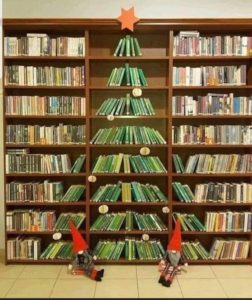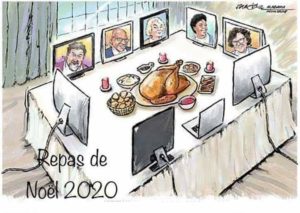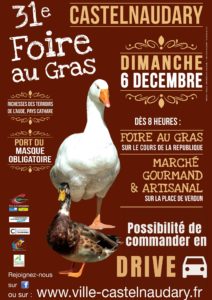The Kasbah Chronicles
Les Chroniques de la Kasbah

In English and en français
This book tree looks as if it is created from copies of Mint Tea and Minarets! I wish!
Joyeux Noël et Bonne Année
Musings
Will COVID soon tiptoe out of the picture?
Covid, va-t-en. On t’a assez vu et entendu
Musings:
My fervent wish in jotting down these final Chronicles of 2020, is for everyone to remain in good health. No need to elaborate. We are literally all in the same boat.
So pour yourself a glass of champagne! Drink up on Zoom, Facetime, or Whatsapp, but drink up. Champagne is produced in my mother’s birthplace, Châlons-en Champagne. Or, savor cerises à l’eau de vie, brandied cherries, a potent cherry brandy that my Alsatian ancestors used to make. (YES! My great-grandmother’s recipe is in my next book!)
Repas de Noel: Is this how one must celebrate in 2020?

Wouldn’t you like to attend this festival?

To savor with many glasses of champagne from Epernay, a champagne-producing town in my mother’s native Champagne
And Christmas cookies galore…like this one from The California Farm Cookbook (by yours truly, Pelican Publishing 1994.) As you know, I travelled around Alta and Baja California interviewing farmers and seeking their recipe for their product. These biscotti are high on my list of favorites:
Tom Cooper’s Molasses Macadamia Nut Biscotti
About 40 biscotti
Make a double batch of these biscotti–the first one is sure to disappear in a flash! At the time, Tom Cooper was a macadamia nut grower in Fallbrook, CA.
3/4 cup butter
1 cup granulated sugar
1/4 cup light molasses
1 egg
2 cups sifted flour
2 teaspoons baking soda
1/2 teaspoon ground cloves
1/2 teaspoon ground ginger
1 teaspoon cinnamon
1/2 teaspoon salt
1 cup unsalted macadamias, crushed
1/2 cup raisins
Sugar for dusting
Preheat oven to 350 degrees. In large bowl, beat together the butter, sugar, molasses, and egg, until smooth.
In a separate bowl, mix the flour, baking soda, and spices. Combine with the butter mixture and mix well. Add nuts and raisins. Divide the dough into two equal parts. Shape each half into log about 2-inches in diameter and 12-inches long. Sprinkle a 14-inch piece of aluminum foil with sugar. Roll each log in sugar until coated. Set them on an ungreased cookie sheet. Bake until crusty, 12 to 14 minutes. Logs will flatten considerably as they bake. Remove from the oven, and cool until soft enough to slice. With a sharp knife cut each log into 1-inch wide diagonal slices. Place on a rack to cool. Store in an airtight container.
Copyright Kitty Morse, 1994.
From our stunning San Diego Library downtown:
A poem: “Looking Forward, I Believe”.
It’s always nice to be included in the San Diego Public Library’s 2019 Local Authors Showcase
San Diego authors penned poems regarding “the issues facing us today, including civic responsibility in a democracy, inequality and discrimination, and the fundamental human right to vote.”
Overheard: Thanks for sharing!
It’s such fun to catch clips of conversation as I walk. Sandy and Sue overheard this in Dana Point, the picturesque harbor south of Laguna Beach, in Orange County (CA.) Thank you for lending me your ears!
“and then they would each get their own sweet potato….” WOW! Must have been a luxury!
“Is Santa older than God?” a child asks her parents.
Overheard near the statue of Santa Claus holding a surfboard.
HERE! The theme of my introduction to my book
Couscous: Fresh and Flavorful Contemporary Recipes (Chronicle Books, 1999, copyright Kitty Morse).
https://www.aljazeera.com/news/2020/12/16/unesco-adds-couscous-to-list-of-intangible-world-heritage
UNESCO’s Inscription of Couscous Traditions, an Example of International Cultural Cooperation
If I may quote myself:
“What pasta is to Italians, what rice is to the Chinese, couscous is to the inhabitants of the Maghreb al-Akhsa (“the land where the sun sets”), as the countries of Morocco, Algeria, and Tunisia are known collectively…”
Why the surprise? From Couscous: Fresh and Flavorful Contemporary Recipes
“Former Tunisian president Habib Bourghiba allegedly once said that couscous is the common thread linking the nations of the Maghreb. In other words, North Africa ends at the point where couscous gives way to rice and millet. This unofficial boundary is thought to lie somewhere west of Lybia’s Gulf of Sidra.”
Unesco quote: “How heritage brings people together. The registration of “Knowledge, know-how and practices related to the production and consumption of couscous” is the result of a joint application by Algeria, Mauritania, Morocco and Tunisia. This joint inscription of a shared heritage illustrates the extent to which intangible cultural heritage can be a subject on which States meet and cooperate.”
Morocco resumes diplomatic relations with Israel:
Why is anyone surprised at this? Co-existence is the norm in Morocco.
Some of you may have already visited the Jewish Museum in Casablanca. As ground-breaking is the fact that Moroccan schools are incorporating the history of Morocco’s Jews into their curriculum. In Arabic! Not the least of which is their cuisine (as described in The Scent of Orange Blossoms: Sephardic Cuisine from Morocco)
« Avant même de normaliser ses relations diplomatiques avec Israël, le Maroc a lancé une réforme scolaire décrite par certains comme un “tsunami”: l’histoire et la culture de la communauté juive vont bientôt être enseignées aux élèves de ce pays où l’islam est religion d’Etat.Les premiers cours, en langue arabe, seront dispensés au prochain trimestre en dernière année de primaire, où l’âge des élèves tourne autour de 11 ans, selon le ministère marocain de l’Education nationale.
“Cette introduction est une première dans le monde arabe. Elle fait l’effet d’un tsunami”, s’exalte Serge Berdugo, le secrétaire général du Conseil de la communauté israélite du royaume, joint par l’AFP à Casablanca. (M. Berdugo was the minister of tourism at one point).
Présent dans l’architecture, la musique, la cuisine, “l’affluent juif” de la culture marocaine apparaît désormais dans les nouveaux manuels d’éducation sociale du primaire, dans un chapitre consacré au sultan Sidi Mohammed Ben Abdellah, dit Mohammed III (XVIIIe siècle). Inscrire l’identité juive dans le corpus scolaire “permettra de forger la perception et la construction de futurs citoyens conscients de leur héritage pluriel”, estime Mohammed Hatimi, un professeur d’histoire spécialiste de la question.
https:// afmilwaukee.org/boutique/
As many of you know, my “American roots” are planted in Milwaukee, WI. The city has quite a sizeable francophone population and an active Alliance Française. Check out their online boutique for some unusual French-theme items.
L’Alliance Française de Milwaukee (où j’ai vécu 9 ans) est très active. Vous trouverez des articles amusants à l’accent français dans leur boutique en ligne…
Recent French fiction about America.
AH! Cette Amérique, on ne cesse d’essayer de la décrire…
https://www.bbc.com/news/world-europe-55069048
That’s interesting: Why France may ban discrimination against accents. The French, like the British, immediately categorize you by the way you speak. . .
https://frenchly.us/french-holiday-songs/
This is a fun site. Listen with kids or grandkids. I sang them when I was growing up!
All the French favorite Christmas songs with words.
Les chants de Noël. Site sympa, surtout pour les enfants.
French word of the month: Did you know Québecois call a podcast a balado?
In Montreal, you don’t say podcast, you say “balado.”
www.linternaute.fr/dictionnaire/fr/definition/balado
« From the verb (se) balader, to walk. C’est l’apocope de baladodiffusion, mot qui équivaut également à l’anglais podcasting. Après le baladeur, qui avait remplacé le walkman. . . Ne dites pas podcast… dites « balado » Le nom balado, né en 2005 au Québec, est entré dans Le Petit Larousse en 2008 et dans Le Petit Robert l’année suivante. » C’est l’apocope de baladodiffusion, mot qui équivaut également à l’anglais podcasting. Après le baladeur, qui avait remplacé le walkman, place au balado ! »
The Rare Seeds That Escaped Syria for an Arctic Vault
Formerly stashed at Svalbard, they’ve since sprouted in Morocco and beyond.
https://www.wired.com/story/these-rare-seeds-escaped-syrias-war-to-help-feed-the-world/
When I was researching A Bibical Feast: Foods from the Holy Land, I got in touch with ICARDA to make sure I was using lentils similar to varieties grown in biblical times. ICARDA was cataloguing 11,000 (eleven thousand) varieties of lentils. I am so happy they have managed to save their agricultural treasures, some of them in Morocco:
“This piece was originally published in Wired and appears here as part of our Climate Desk collaboration. In 2014, the remaining staff of the International Center for Agricultural Research in the Dry Areas, or ICARDA, fled their beloved gene bank in Tel Hadia, 20 miles south of Aleppo. Syria’s civil war, which had broken out three years earlier, had finally made the staffing of the facility untenable. But the scientists had already shipped off a resource of incalculable value: the seeds of the most important crops on Earth.”
Merci for reading!
Until next year!
Please leave a comment.. I will answer!
KM
Recent Comments